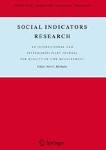Artículo de investigación
Título: Social and Economic Wellbeing in Europe and the Mediterranean Basin: Building an Enlarged Human Development Indicator
Fuente: Social Indicators Research
Resumen: This paper calculates a human Wellbeing Composite Index (WCI) for 42 countries, belonging to the European Economic Space, North Africa and the Middle East, as an alternative to the shortcomings of other well-known measures of socio-economic development (i.e. Gross Domestic Product per head and Human Development Index). To attain this goal, different data envelopment analysis (DEA) models are used as an aggregation tool for seven selected socio-economic variables which correspond to the following wellbeing dimensions: income per capita, environmental burden of disease, income inequality, gender gap, education, life expectancy at birth and government effectiveness. The use of DEA allows avoiding the subjectivity that would be involved in the exogenous determination of weights for the variables included in WCI. The aim is to establish a complete ranking of all countries in the sample, using a three-step process, with the last step consisting in the use of a model that combines DEA and compromise programming, and permits to obtain a set of common weights for all countries in the analysis. The results highlight the distance that still separates Southern Mediterranean countries from the benchmark levels established by some European countries, and also point to the main weaknesses in individual countries’ performance. Nordic countries, plus Switzerland, top the list of best performers, while Mauritania, Libya and Syria appear at the bottom.
Ver artículo







